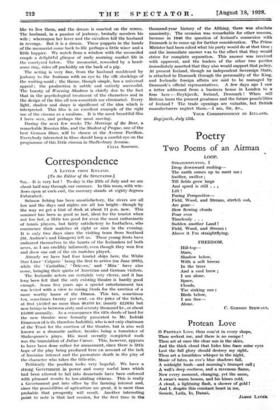Correspondence
A LETTER FROM ICELAND.
[To the Editor of the SPECTATOR.]
SIR,—It is very hot ! To-day is the 25th of July and we are about half-way through our summer. In this room, with win- dows open at each end, the mercury stands at eighty degrees Fahrenheit.
Salmon fishing has been unsatisfactory, the rivers are all low and the days and nights are all too bright—though by the way we get a hint of dusk at about 11 p.m. now. This summer has been as good as last, ideal for the tourist when not too hot, a little too good for even the most enthusiastic of tennis players, but fairly satisfactory to footballers, who commence their matches at eight or nine in the evening. It is only two days since the visiting team from Scotland (St. Andrew's and Glasgow) left us. These young Scots have endeared themselves to the hearts of the Icelanders (of both sexes, as I am credibly informed), even though they won five and drew one out of the six matches played.
Already we have had four tourist ships here, the White Star Liner Calgarie ' being the first to arrive (on June 28th), while the 'Carinthia,' Orinoco,' and 'Mira' have also come, bringing their quota of American and German visitors.
The Icelandic actors are certainly very clever, and it has long been felt that the only existing theatre is hardly good enough. Some five years ago a special entertainment tax was levied with a view to raising fends for the erection of a more worthy home of the Drama. This tax, sometimes ten, sometimes twenty per cent. on the price of the ticket, at first yielded no more than 40,000 kr. (nearly £2,000) but now brings in between sixty and seventy thousand kr., or about 13,000 annually. As a consequence the title deeds of land for the new theatre were formally presented to Mr. Indridi Einarsson (d is th, therefore Indrithi), who is not only chairman of the Trust for the erection of the theatre, but is also well known as a dramatic author, besides being a translator of Shakespeare's plays. His most recently completed work was the translation of Julius Caesar. This, however, appears to have been done rather for amusement, since there is little hope of the play being produced here on account of the lack of feminine interest and the premature death in the play of the character who takes the title-role.
Politically the position looks very hopeful. We have a strong Government in power and many useful laws which had been allowed to fall into desuetude have been enforced with pleasant results to law-abiding citizens. This is really a Government put into office by the farming interest and, since the possibilities of agriculture arc great, it is more than probable that prosperity will result. Another interesting point to note is that last session, for the first time in the thousand-year history of the Althing, there was absolute unanimity. The occasion was remarkable for other reasons, because in 1940 the question of Iceland's connexion with Denmark is to come up for further consideration. The Prime Minister had been asked what his party would do at that time ; and the immediate answer v as to the effect that they would strive for complete separation. This answer was received with approval, and the leaders of the other two parties immediately asserted that they also would support that policy. At present Iceland, though an independent Sovereign State, is attached to Denmark through the personality of the King, and Icelandic foreign affairs are said to be managed by Denmark's official representatives. A few days ago I saw a letter addressed from a business house in London to a firm here :—Reykjavik, Iceland, Denmark ! When will Britons learn the present greatness and the future possibilities of Iceland ? The trade openings are valuable, but British manufacturers neglect them.—! am, Sir, tic.,
































 Previous page
Previous page